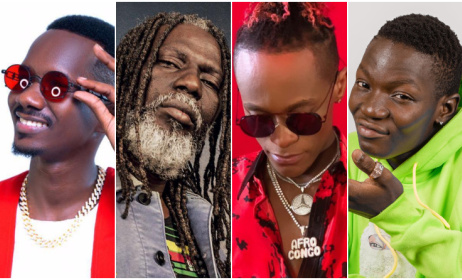Bassline Fest: Ladysmith Black Mambazo to rekindle love for Mandela
Ladysmith Black Mambazo are unquestionably South Africa’s best choral group that keeps flying the country’s flag high. Founded by Joseph Shabalala in 1960, the nine-member ensemble gained prominence when they collaborated with US singer-songwriter Paul Simon on the Graceland album in 1986.
 Ladysmith Black Mambazo with Nigerian singer Yemi Alade at Nelson Mandela's house in Soweto, Johannesburg.
Ladysmith Black Mambazo with Nigerian singer Yemi Alade at Nelson Mandela's house in Soweto, Johannesburg.
The iconic isicathamiya group’s music has impacted on the lives of many people – ordinary and influential – and is credited for preserving the country’s cultural industry through their rich music and traditionally inspired choreography. A favourite of Nelson Mandela, the award-winning ensemble caught the attention of the former statesman, which prompted him to declare the group as South African cultural ambassadors.
The group, which boasts five Grammys, has played around the world as part of a career spanning more than five decades. Their headlining performance at Bassline Fest in Johannesburg on 26 May, which celebrates Africa Day and commemorates Mandela's legacy, will rekindle the personal relationship they enjoyed with the struggle icon.
Ladysmith Black Mambazo member and son of Joseph Shabalala, Sibongiseni, spoke to Music In Africa ahead of the pan-African concert in Johannesburg.
MUSIC IN AFRICA: What are your expectations at Bassline Fest?
We're looking forward to perform for our South African fans. It’s different when you perform overseas for an audience that doesn’t understand the language and does not know the songs. So when we perform in South Africa, we look forward to seeing people enjoying our performances because people know us.
What significance does Africa Day have on you as artists?
Africa Day is important for us as Africans to know who we are because it’s about knowing our identity. For us as Ladysmith Black Mambazo, Africa Day is important in the sense that we are doing traditional music and it’s easy for us to compete with the rest of the world based on what we know. You don’t have to try to change yourself by imitating other people. People will accept you when you know who you are. It’s very difficult for someone to succeed if they don’t know their identity. So Africa Day reminds us to remain conscious and true to our African roots.
What’s the significance of Nelson Mandela’s legacy on Africa Day?
As Ladysmith Black Mambazo we have a history of working with Nelson Mandela, our leader. After coming out of prison in 1990 he had his birthday at Carlton Centre in Johannesburg in 1993 and he invited Ladysmith Black Mambazo to perform. It was a happy moment for me. It was such a great honour because I was still young. It was the year I joined the group. That day was my fifth or sixth performance with Ladysmith Black Mambazo. We have a great history with uBaba Tata Mandela. I just wish he could have made it to a 100.
Is your father, Joseph Shabalala, still active in the group?
No. My father is no longer active in the group. He just stays at home. We visited him at home recently because we had just arrived from tour after winning the Grammy in January. So we went there to show him the fifth Grammy and he was very happy. He still gives us advice here and there but he is taking his time enjoying his retirement at home.
Who is leading the band now?
My father left four sons in the group when he retired. He told us to continue working together so that the group remains strong. That's basically what we are doing, taking leadership from two founding members who are still in the group, namely Albert Mazibuko and his brother Abednego.
Your present and future fans would want Ladysmith Black Mambazo to keep going for many years to come. People pass way, some retire. Do you have plans to keep the group going as an intergenerational effort?
My father's tradition is that everyone at home, even those who visit, sing with us. Ladysmith Black Mambazo doesn’t do closed rehearsals. Everybody around us rehearses with the group. So when someone retires, it’s easy to replace them with someone who can fit in their shoes. We don’t do auditions because we need someone who knows our songs and culture.
Why did you rerecord Shaka Zulu, an album that was originally released in 1987?
We went back to record it to celebrate the 30th anniversary of the album, which also won the Grammy. The other reason was to honour our father and other members who had retired from the group.
Any future collaborations?
Oh yes! We welcome anyone who wants to collaborate with us. We recently recorded a song with Lira, which will feature on her album, and this year we spoke to Salif Keita who wants us to put some voices on his song.




























Commentaires
s'identifier or register to post comments